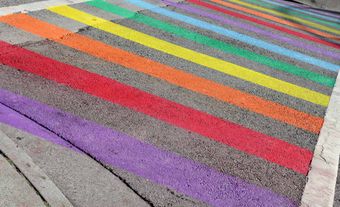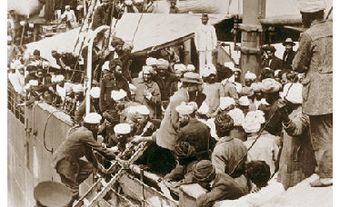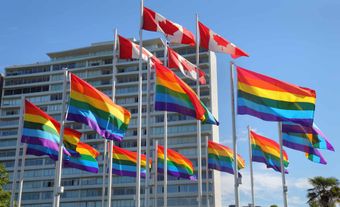The Brunswick Four refers to four lesbian women — Adrienne Rosen (formerly Adrienne Potts), Pat Murphy, Sue Wells and Lamar Van Dyke (formerly Heather Elizabeth Nelson) — who were thrown out of a Toronto bar on 5 January 1974. Their expulsion and eventual detention led to charges and significant public outcry at their treatment by the bar staff and the police. The Brunswick Four case raised awareness about homophobia and harassment in Canada, and fueled Toronto’s growing LGBTQ2S+ rights movement.

Toronto, 2016.
The Incident
On 5 January 1974, Adrienne Rosen, Pat Murphy, Sue Wells and Lamar Van Dyke attended an amateur performance night at a popular pub, the Brunswick House, in Toronto’s Annex neighbourhood.
Three of the women took to the stage to perform the parody song, “I Enjoy Being A Dyke,” their adaption of the Rodgers and Hammerstein song entitled “I Enjoy Being a Girl.” Despite applause from other patrons, the four women were refused further service and the manager of the pub ordered them out of the bar. When they refused to leave, the manager called the police.
Rosen, Murphy, Wells and Van Dyke were dragged from the Brunswick House by eight Toronto police officers, injuring two of the women in the process. The four later attested that the police made inappropriate and harassing comments to them while they were escorted to the station. No charges were laid, but the four women were refused their right to call a lawyer during their detention. Upon release, Rosen, Murphy, Wells and Van Dyke refused to leave the station and were eventually forcibly removed from the building. Adrienne Rosen was punched and thrown to the ground by a police officer in the resulting struggle.
After leaving police custody, Rosen, Murphy, Wells and Van Dyke returned to the Brunswick House to get testimony from witnesses who may have seen the incident earlier that night. Upon re-entering the pub, they were immediately ordered to leave by the manager, pub security and police officers who were on scene. Once again, the four women were forcibly removed from the bar. Rosen, Murphy and Van Dyke were taken to the police station where they were held for several hours. While they were detained by the police, the three women faced abuse from the police officers, who hurled derogatory and homophobic slurs at them. This time the police pressed charges; Rosen, Murphy and Van Dyke were charged with creating a disturbance. Van Dyke was also charged with obstructing the police.
The Trial
Toronto lawyer and former Liberal Cabinet minister Judy LaMarsh represented the Four in court. A high-profile lawyer, LaMarsh took on the case because she felt outraged by the way the police had treated the four women. Toronto’s LGBTQ2S+ community rallied around the Four, holding fundraising dances and attending the trial each day. During the trial, Adrienne Rosen faced the additional charge of obstruction of justice, which was later dropped. All charges were dismissed, except for the charge of creating a disturbance against Adrienne Rosen, who was convicted. She was given a suspended sentence and placed on three months’ probation.
Over the course of the trial, the full extent of the abuse the four experienced at the hands of police also came to light; Pat Murphy testified that, as the four friends left the police station, she overheard one of the police officers saying that the women were “the scum of the earth and should be shot.” In 1976, an inquiry into police practices only acknowledged that, during the incident, “some of the officers” used “abusive language in addressing the women.” The report justifies this abusive language by saying it was a response to the abusive language of the women.
Community Response and Significance
The arrest and trial of the Brunswick Four took place in an era when lesbians in Canada frequently faced discrimination and harassment in public spaces. LGTBQ2S+ activism was growing in Canada at that time (see Lesbian, Gay, Bisexual and Transgender Rights in Canada) and the Brunswick Four inspired Toronto’s LGBTQ2S+ community in the ongoing fight for their rights. (See also Toronto Bathhouse Raids.)
“I have heard that I was courageous. In retrospect, and in the present, it has always been an issue of basic survival – physical, emotional and spiritual. Maintaining one’s own integrity and a desire to positively influence the present societal circumstances in which I find myself and others.”
— Pat Murphy

 Share on Facebook
Share on Facebook Share on X
Share on X Share by Email
Share by Email Share on Google Classroom
Share on Google Classroom



